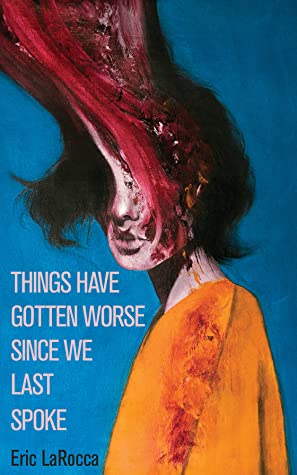
[Weirdpunk Books; 2021]
There is a version of horror literature founded on taking the rationally frightening to the point of irrationality. Our life is filled with frightening things: lost lives, mysteries of nature, fear of death, as well as the more mundane. Usually, to grapple with these things, we try to make sense out of them. But there’s always some part of what we fear that lies beyond our rational reach. Something exists that does not play by the rules of the rest of our life. The normal tools won’t apply, and certainly won’t keep us safe.
This irrationality is at the heart of Eric LaRocca’s new novella Things Have Gotten Worse Since We Last Spoke, a story that spotlights a tiny fissure of discomfort about the seeming intimacy of our many anonymous online interactions and breaks it open as widely as possible. Its success is precisely on its willingness to take something simple past where it would make sense, and into the realm of the irrational where consequences never seem to line up with caution.
Agnes Petrella posts on a queer forum trying to sell a family heirloom to make rent. She gets contacted by Zoe Cross who is interested in buying the item, but when she discovers Anges’ financial situation, she simply transfers her a bulk of money. Agnes is floored and they begin a correspondence that quickly leans romantic. This is told through a series of emails and instant messages, a structure familiar to readers of horror writers like John Langhan or Gemma Files.
Petrella’s vulnerabilities are seen quickly by Cross who unveils her true dream: to have totalizing control over another person. That means bank accounts, all behavior, even when, and what, her ward eats. Petrella submits to this masochistic position quickly without ever meeting Cross, performing small flourishes that Cross demands. These sexualized displays, including several that eventually lead to Petrella losing her job, give her a rush, but it escalates from there.
To protect the plot we should leave the later events to the reader, but suffice it to say that the demands turn both violent and immolating. Petrella goes back and forth on Cross’ provocations, but in the end, it is Petrella’s obsession that consumes both characters. In the conversations, particularly the emails, Petrella’s language becomes a sort of vulgar dance, she dives so completely into the excursions commanded by Cross that the reader wonders how much about this is related to the relationship and how much it is simply an opportunity for Petrella to give in to her own detached mania.
The book is exceedingly short, I read it in one sitting in less than an hour and a half. Because it is entirely built on dialogue of a type, it has the feeling of a stage play, except with two characters who never share the same space. This actually presents one of the only challenges to the narrative: it takes a leap of faith for the reader to believe that each character’s radicalization is possible. Within just a couple of exchanges, Petrella commits to a very extreme S&M relationship with Cross, even professing a life-devouring love and devotion, and they have never met. Likewise, we know so little about Cross that it is debatable if she is the person she says or if this is anything other than some type of cruel performance. And that could be the point. In the world of largely anonymous internet relationship building we are only what we say we are, and that allows for the people who bear witness to our presentation to fill the gaps. Cross could have been anyone, she was anyone, and Petrella’s life unraveled with just the smallest tug of a string.
The body horror of the book is largely intuited, and that makes it all the more ferocious, yet the use of sickness as a proxy for family works well. The way that Cross leads Petrella through her transformation feels right at home in a media landscape scarred by high profile tabloid stories where online partners scheme with their admirers to kill their parents or kill themselves, like the Michelle Carter case where she was charged after coaxing her teenage boyfriend to commit suicide through a series of text messages. The ambiguity of these cases hangs over the text itself: Cross pulls away and Petrella keeps going, even accelerates, until things have gotten worse than could have been imagined.
Eric LaRocca is a voice to keep watching after this effort, and he says in the acknowledgements that he wrote the book in what amounts to five days of creative frenzy. Maybe this put him into the self-destructive mindset that overtook his characters. The book is really about how brief and tenuous our own self-composure actually is. Maybe we are all about to be pushed over the edge.
Shane Burley is the author of Fascism Today: What It Is and How to End It (AK Press, 2017), and the recently published Why We Fight: Essays on Fascism, Resistance, and Surviving the Apocalypse (AK Press, 2021). His work has appeared in Jacobin, Salon, Truthout, In These Times, Waging Nonviolence, ThinkProgress, Political Research Associates, Alternet, and Roar Magazine.
This post may contain affiliate links.







